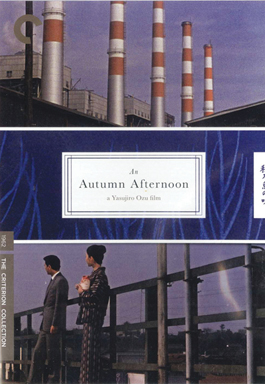home | metro silicon valley index | movies | current reviews | dvd review

An Autumn Afternoon
One disc; Criterion Collection; $29.95
Reviewed by Michael S. Gant
Gene Hackman's detective in Night Moves joked that an Eric Rohmer movie is like watching paint dry. It could also be said that a Yasujiro Ozu movie is like watching high-gloss lacquer dry. But the attention to minute detail and the sometimes glacial shifts in emotional dynamics seen in both Rohmer and the great Japanese director are worth cherishing—they reward the contemplative moviegoer. Ozu's last film, 1962's An Autumn Afternoon, shows that the director was as comfortable with color composition as he was with black and white. The opening shot sets us near a factory with red-and-white striped towers like industrial candy canes. The apartments his characters occupy are accented with brightly hued touches—especially a space-age red and chrome vacuum cleaner—that contrast with the button-down gray suits the men wear; they all look like extras from Mad Men. The story—simple in outline but complex in implication—follows Mr. Hirayama (Chishu Ryu), a widower who lives with a bumptious son and a dutiful daughter, Michiko (Shima Iwashita), both in their 20s. Another son, Koichi (Keji Sada), lives downstairs with his wife, Akiko (the wonderful Mariko Okada). Mr. Hirayama's friends all urge him to marry off Michiko before it's too late, even though she shows no urgency in that department. Mr. Hirayama doesn't really want to let go of his comfortable familial relationship; it represents a sense of continuity with his wife, whose memory still lingers. In a larger sense, nostalgia for the old ways tugs at many of the characters. In one scene, Mr. Hirayama and a stranger sit in a bar and wonder what the world would have been like if Japan hadn't lost the war. Eventually, an arranged marriage takes place, and it is a tribute to Ozu's deference that we're not sure if this represents a happy ending or not. In its delicate way, this is a comedy. One of Mr. Hirayama's colleagues has gotten remarried to a much younger wife, and several jokes about a kind of herbal Viagra fly freely. Michiko's stay-at-home brother keeps ordering his sister around, but the traditional roles can't hold, and she gently deflects his foolish masculine prerogatives. More overtly, the tart-tongued Akiko tries to curb her husband's foolish excesses, like the set of golf clubs he covets instead of the refrigerator they need. Unobtrusively, Ozu sets his camera a little low, as if the viewer were sitting cross-legged in the Japanese style. Most of the shots are held a beat longer than you might expect, with almost no tracking shots. And yet the film never feels static; the action proceeds with a natural fluidity that doesn't need artificial dramatics. This Criterion Collection, beautifully restored, includes audio commentary with film historian David Bordwell, an interview with some French critics, a documentary about Ozu and a booklet with articles by Geoff Andrew and Donald Ritchie.
Click Here to Talk About Movies at Metro's New Blog
Send a letter to the editor about this story.
|
|
|
|
|
|